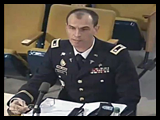
Lt. Col. Robert Roussel, the Deputy Commander of USARIEM and Forensic Toxicology Consultant to the Army Surgeon General provided his insight into best lab practices during the Massachusetts House Committee Post Audit and Oversight Hearing on the State Drug Lab that took place in light of recent Massachusetts state lab scandals on Nov. 28, 2012.
|
A Soldier from the U.S. Army Research Institute of Environmental Medicine, in Natick Mass., was recently invited to speak as a subject matter expert on lab best practices during the Massachusetts House Committee Post Audit and Oversight Hearing on the State Drug Lab.
Lt. Col. Robert Roussel, the Deputy Commander of USARIEM and Forensic Toxicology Consultant to the Army's Surgeon General, provided his insight into best lab practices at this hearing that took place in light of recent Massachusetts state lab scandals on Nov. 28, 2012.
Roussel, who has previously been involved in the Army's forensic toxicology urine lab program for 10 years, shared some of his experiences as an Army forensic toxicologist. He said that for a lab to be successful it is vital that employees at every level work together to ensure proper procedures are being followed.
"There is no magic formula or any one thing that yields a laboratory capable of producing scientifically valid and forensically supportable results," Roussel said. "It takes a comprehensive system of well trained, capable and dedicated employees, hands on supervision, internal and external quality systems, proper resourcing and carefully crafted policies and procedures with multiple layers of review."
This hearing happened as authorities continue to deal with the fallout from a scandal that threatens to unravel thousands of criminal cases after a Massachusetts chemist was accused of faking drug test results.
Roussel said that he shared some of the practices of the Army forensic toxicology labs that he was been a part of and supervised in the hope that there would be information that could help the commonwealth of Massachusetts correct deficiencies in their labs.
"I believe that forensic labs are much like any other industry," Roussel said. "We all have a challenge to ensure that employees that are motivated for whatever reason to do wrong are detected early."
While the type of labs that Roussel has led were not criminal labs, but rather meant to test drug usage in an individual from a specimen, Roussel said the methods for handling this sensitive material are methodical and must be supervised closely.
"Our policies and procedures manual, or standard operating procedures known as SOPs, are inches thick," Roussel said. "And virtually everything that we did in the lab, we had an SOP for… that was reviewed and updated annually. It was my job to ensure all employees read and understood these policies and procedures. "
Roussel said that it is up to the management and employees in a lab to ensure that they are doing quality work 365 days a year that makes a lab efficient, effective and most importantly credible. Equally important, Roussel said is that each person at every level must work together to ensure that any specimen that enters a lab must be accounted for at all times.
"Chain of custody (of specimens) is absolutely critical," Roussel said. "Without it, it's not forensic work."
USARIEM provides solutions to optimize warfighter health and performance through medical research. USARIEM is recognized by many DoD organizations as the trusted leader in medical research for warfighter health and performance.
Learn more at Army.mil
|